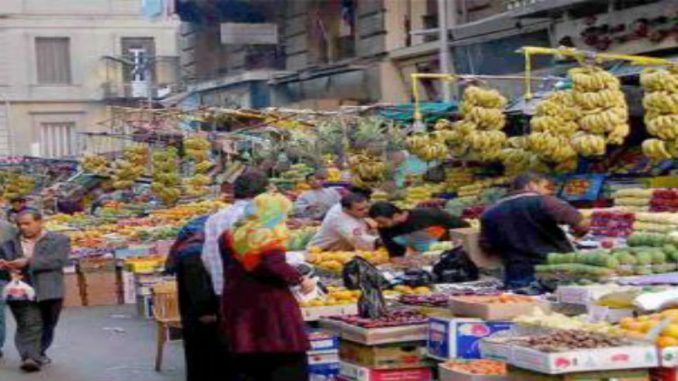
As Muslims’ holy month Ramadan is on its way, most Muslims families around the world pay great attention and time to afford different types of foods that they will consume to compensate for the long fasting hours.
It is widely common custom that many of them may dedicate a two-day period to wandering around the markets before the arrival of this holy month to buy the necessary food commodities as a stock for Ramadan.
Muslim Arab’s popular markets usually witness unprecedented and large-scale crowds at that time, from customers who mainly focus on affording enough stock of meat and chicken in their refrigerators.
However in Egypt the situation is different in 2017, as the country is currently suffering from unprecedented price hikes due to recent economic measures implemented by the government, to meet the conditions of the International Monetary Fund Loan.
Last year, Al-Sisi’s government has worked to fulfill the IMF economic reform program to secure the loan.
In this context, the International Monetary Fund’s executive board has approved Egypt’s request to secure $12 billion loan facility after Egypt met its requirements last November .
On August 30 Egypt started its first steps towards the loan when Egypt’s parliament approved a long-awaited law introducing a value-added tax (VAT) of 13 %, rising to 14% in the next fiscal year.
On November 3, the Central Bank of Egypt floated the Egyptian pound and gave up trying to peg the currency to the US dollar allowing it to devalue by almost half.
On November 4, Egypt took another unprecedented decision, which has always been abandoned by former leaders in fear of public unrest, to cut subsidies for fuel leading to jump in prices, in addition to the introduction of the value-added tax to raise revenues.
Before the arrival of the holy month each year; shoppers used to be buy intensively the stock that will be sufficient for the entire month, the Egyptian popular markets for vegetables, meat and chicken was traditionally targeted by large numbers of Egyptian customers to save themselves from the trouble of doing so later, when they would be fasting.
However, a remarkable shrinkage in sales has dominated the Ramadan 2017 season in Egypt, especially with those buying meat and chicken.
Inside one of Egypt’s popular districts Sayeda Zeinab, Gamal Ashraf, meat merchant, stressed that markets are now suffering from a shrinkage due to the unparalleled wave of high prices.
He added that the price hikes have pushed him to replace selling local meat in his store by imported ones that were less expensive.
He explained,”The sales of meat ratios are witnessing a decrease. People are no more buying the local meat that its price reaches 130 L.E per the single kg, while the imported one that came from Brazil is estimated by 70 L.E per the single kg.”
In addition, Gamal mentioned that the emergence of the Egyptian Armed Forces’ vehicles that distribute subsidized imported meats has also left a negative impact on his trade.
He claimed that the distributed subsidized meats that are imported from Brazil are not efficient and tasty like the local one.
In the same context, Omaima El Naggar a housewife who is a resident of Sayeda Zeinab neighborhood asserted, said that the subsidized meats present at army vehicles are not as tasty as the local ones, so she resorted to buy the local expensive one whose price reaches LE120.
She explained,”I put a weekly nutrition schedule for Ramadan that will only include two meats meals per week; because, if I increase the meat share like the past year, there will be no money left to spend till the end of the month.”
It is worth mentioning that the Egyptian Armed Forces received direct orders from the Presidency to spread far and wide the affiliated moving vehicles that sell food commodities for less, compared to civil markets.
In the same context, the prices of fresh chickens witnessed increase and reached 35 L.E per the single kg in the popular market of Sayeda Zeinab neighborhood.
Meanwhile, a poultry-seller based in Sayeda Zeinab’s popular market, Khalid Sharara said that the ratio of people who came in similar period last year [prior Ramadan by a week] was more than 2017’s one that is badly damaged due to the high prices.
He said, “Last year, prices of the poultry’s single kg reached 22 L.E, this year there is an increase by more than 10 L.E , so people do not buy with the same quantities as they no more have enough money to live.”
Even in Garden City, one of Cairo’s most stylish and affluent neighborhoods, the situation was somewhat similar especially concerning the wave of exaggerated high prices for food commodities.
One of the managing officials of a majestic food store, who preferred to remain anonymous, said that his store was selling meat and chicken to the residents of Garden City in 2016 ; however, this year, he decided to suspend selling meat as the residents are now heading to buy meat from nearby middle-class neighborhoods that sell them for less.
In the same path, Ali Hesham, a resident of Garden city asserted that he and other residents in this affluent neighborhood are suffering from the greed of meat merchants, prompting them to buy from a nearby neighborhood that sell at lower prices.
He concluded, “Meat merchants are now selling the single kg of meat in Garden City for LE160!! This price is higher than any other place around Egypt; there is about LE50 that they pick from our pocket with their greed.”



